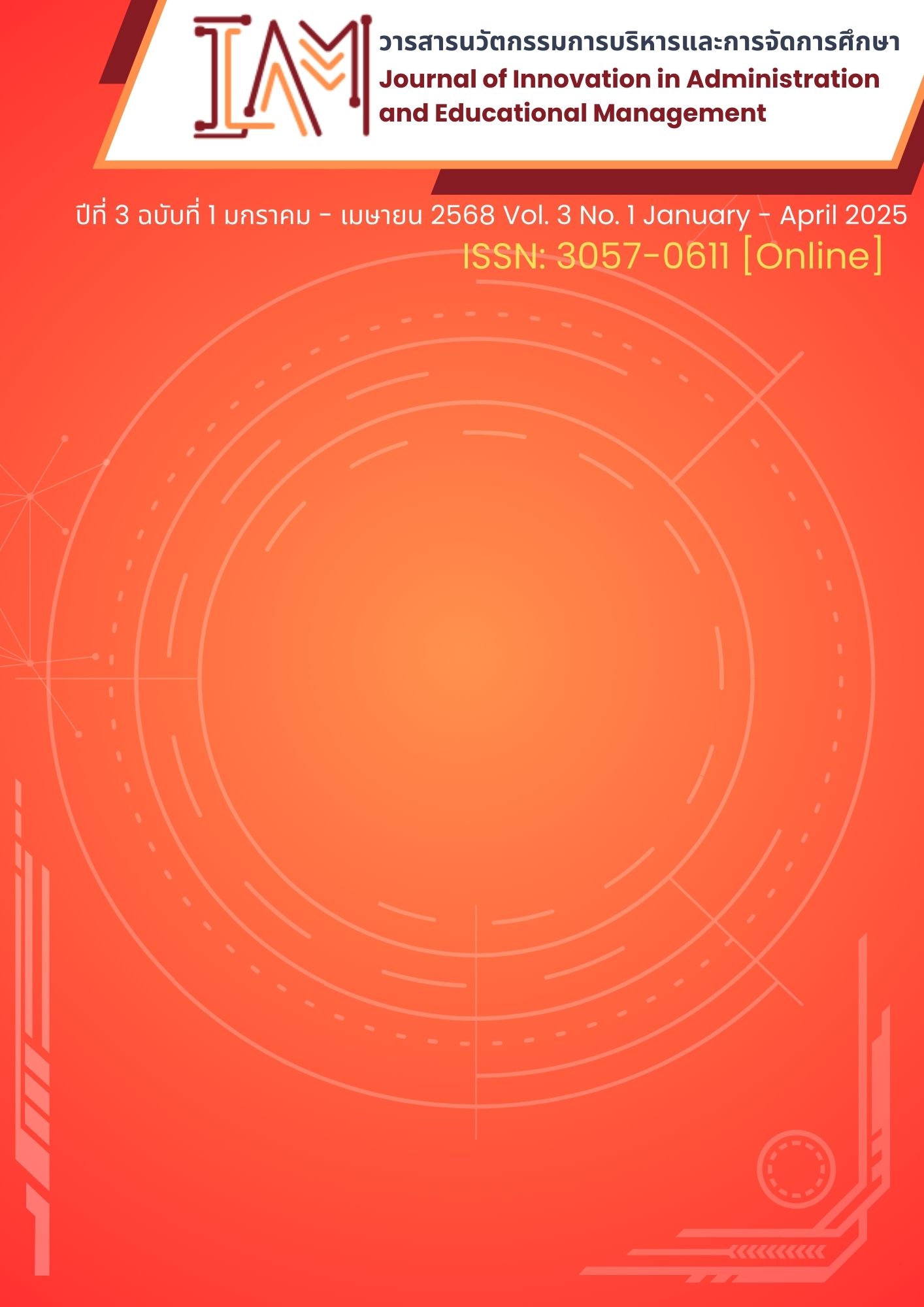Soft Power for Learning Management in the 21st Century
Keywords:
Soft Power, Learning Management, 21st CenturyAbstract
In the 21st century, characterized by rapid changes and complex challenges, education has become a crucial tool for developing human potential to face the future. Soft Power, which focuses on building attraction and credibility through culture, communication, and engagement, is recognized as a significant concept that can be integrated into all forms of education systems - formal, non - formal, and informal. The ongoing advancements in information technology have introduced uncertainties, replacing traditional wisdom and local culture, which are fundamental to national education. By employing culture as a form of Soft Power, this approach becomes a tool to build capacity and enhance the quality of future generations through socialization. This article aims to explore learning management approaches for 21st - century educational institutions by highlighting how daily perceptions and cultural education, combined with Soft Power, serve as natural, indirect methods for fostering values and cultural appreciation. This leads to widespread recognition and adaptability to rapidly changing circumstances, greatly benefiting human resource development. Soft Power contributes to shaping individuals who are lifelong learners, continuously developing themselves to keep up with the world, and becoming citizens of the 21st century and beyond. Soft Power plays a pivotal role in 21st-century learning management by focusing on creating motivation and credibility through communication and participation, rather than coercion. It can be effectively applied across various educational systems. For instance, in formal education, Soft Power integrates culture, art, and technology into curricula to inspire and nurture students' creativity. In non-formal education, Soft Power promotes professional training and community learning networks. Meanwhile, in informal education, it supports lifelong learning through digital media and online communities. Proper application of Soft Power helps develop learners in critical thinking, adaptability, global citizenship, and lifelong learning, enabling them to respond sustainably to future changes.
Downloads
References
ชูศักดิ์ ชูศรี. (2564). การรับรู้รูปแบบอำนาจละมุน (Soft Power) ในมุมมองของนักท่องเที่ยวชาวต่างชาติที่เข้ามาท่องเที่ยวในพื้นที่อำเภอเกาะสมุย จังหวัดสุราษฎร์ธานี. Journal of Social Science and Cultural. 8(7), 152 - 161.
นิติราษฎร์ บุญโย. (2565). Soft Power ของไทย? ความหมาย ความจริงและความฝัน กรุงเทพธุรกิจ. สืบค้น 10 พฤศจิกายน 2567, จาก https://www.bangkokbiznews.com/blogs/
columnist/999871
พิณสุดา สิริธรังศรี. (2560). การพัฒนาการศึกษาเพื่อความเป็นพลเมือง. สุทธิปริทัศน์, 31(100), 100 - 113.
พีระ เจริญวัฒนนุกูล. (2565). "ยุทธศาสตร์ Soft Power" ของไทย และความหนักใจในการสร้าง Moral Authority ด้านการต่างประเทศ. สืบค้น 1 ตุลาคม 2567, จาก https://isc.mfa.go.th/en/content/ยุทธศาสตร์-soft-power-ของไทย?cate=5f204
a5928600c531517cb75
วิจารณ์ พานิช. (2555). วิถีสร้างการเรียนรู้เพื่อศิษย์ ในศตวรรษที่ 21. (พิมพ์ครั้งที่ 3). กรุงเทพฯ: มูลนิธิสดศรี - สฤษวงศ์.
สำนักงานคณะกรรมการการศึกษาขั้นพื้นฐาน, สำนักบริหารงานการมัธยมศึกษาตอนปลาย. (2560). แนวทางในการจัดทักษะการเรียนรู้ในศตวรรษที่ 21. กรุงเทพฯ: ชุมนุมสหกรณ์การเกษตรแห่งประเทศไทย จำกัด.
สุภาพิชญ์ ถิระวัฒน์. (2565). Soft Power (อำนาจละมุน). กรุงเทพฯ: สำนักงานเลขาธิการสภาผู้แทนราษฎร.
สุรชาติ บำรุงสุข. (2557). Soft Power. กรุงเทพฯ: สถาบันการข่าวกรอง สำนักข่าวกรองแห่งชาติ.
อิงอร เนตรานนท์. (2562). พลังอำนาจแห่งชาติซอฟต์พาวเวอร์ของไทยในศตวรรษที่ 21. วารสารสถาบันวิชาการป้องกันประเทศ, 11(1), 33 - 47.
Atkinson, Carol. (2010). Does Soft Power Matter? A Comparative Analysis of Student Exchange Programs 1980 – 2006. Foreign Policy Analysis, 6(1), 1 – 22.
McClory, J. (2012). The New Persuaders III. Monocle: Institute for Government.
Nye, J. S. (2004). Soft Power: The Means to Success In World Politics. New York: Public Affairs.
Partnership for 21st Century Skills. (2009). Framework for 21st Century Learning. Retrieved October 1, 2024, from http://www.p21.org/about-us/p21-framework
Downloads
Published
How to Cite
Issue
Section
License
Copyright (c) 2025 Journal of Innovation in Administration and Educational Management

This work is licensed under a Creative Commons Attribution-NonCommercial-NoDerivatives 4.0 International License.






